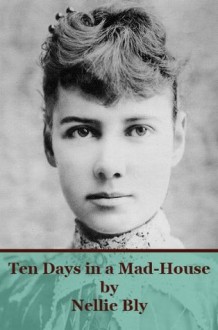
I probably would have liked reading Bly’s landmark investigative journalism more if this edition didn’t include a host of similar articles at the end with titles like “Nellie Bly as a White Slave.” A better description would be “Nellie Bly Doesn’t Realize References and Work Experience is Important, Shocked to Discover Entry Jobs Universally Suck.”
The true meat of TEN DAYS IN A MAD-HOUSE isn’t the lackluster reporting Nellie Bly did on factory girls and servant agencies, but her undercover work in one of the toughest mental wards in New York City. It’s not hard to see why Bly’s articles spurned on immense reform after their original publication, as Bly’s experiences with the rampant mistreatment of the 1880s’ medical world feel shocking even to this day. In addition to the truly appalling conditions she and her fellow inmates were forced to endure, the nurses openly tortured and gaslighted their charges to the point that any relatively sane woman swiftly found themselves spiraling into mental breakdowns. The doctors, unaware the “mad” complaints made about their nurses had any factual basis, felt justified in keeping their “delusional” charges locked up forever in consequence.
At the same time, I find myself loathe to side with Bly’s conclusions about her stay and fellow inmates. Either due to her stylistic flair or completely unrealistic expectations, she puts just as much emphasis on like bad tasting tea as she does literal torture—in fact, she spends more time complaining the food than everything else combined. Furthermore, she’s quick to assume everyone around her is completely rational and sane after only a conversation or two, so long as they don’t exhibit anything short of violent or hysterical behavior. Armchair psychology might have been the bee’s knees for a sensations reporter in the nineteenth century, but it reads as wildly ignorant now. Granted, it’s better than the doctor’s “madness measurements” and eye exams, but not by much.
Is the book and Nellie Bly’s journalism worthy of respect and acclaim? Of course. Is it also dated and biased? Yes. It wouldn’t surprise me if Nellie Bly is the reason that ~*Victorian women were committed for anything all the time because they had no rights!*~ garbage is still preached as truth to this day. But it’s an agenda piece about genuine problems, written with a respectable goal in mind and it led to important healthcare reforms afterward. Worth a read if the subject matter interests you.

 Log in with Facebook
Log in with Facebook 





